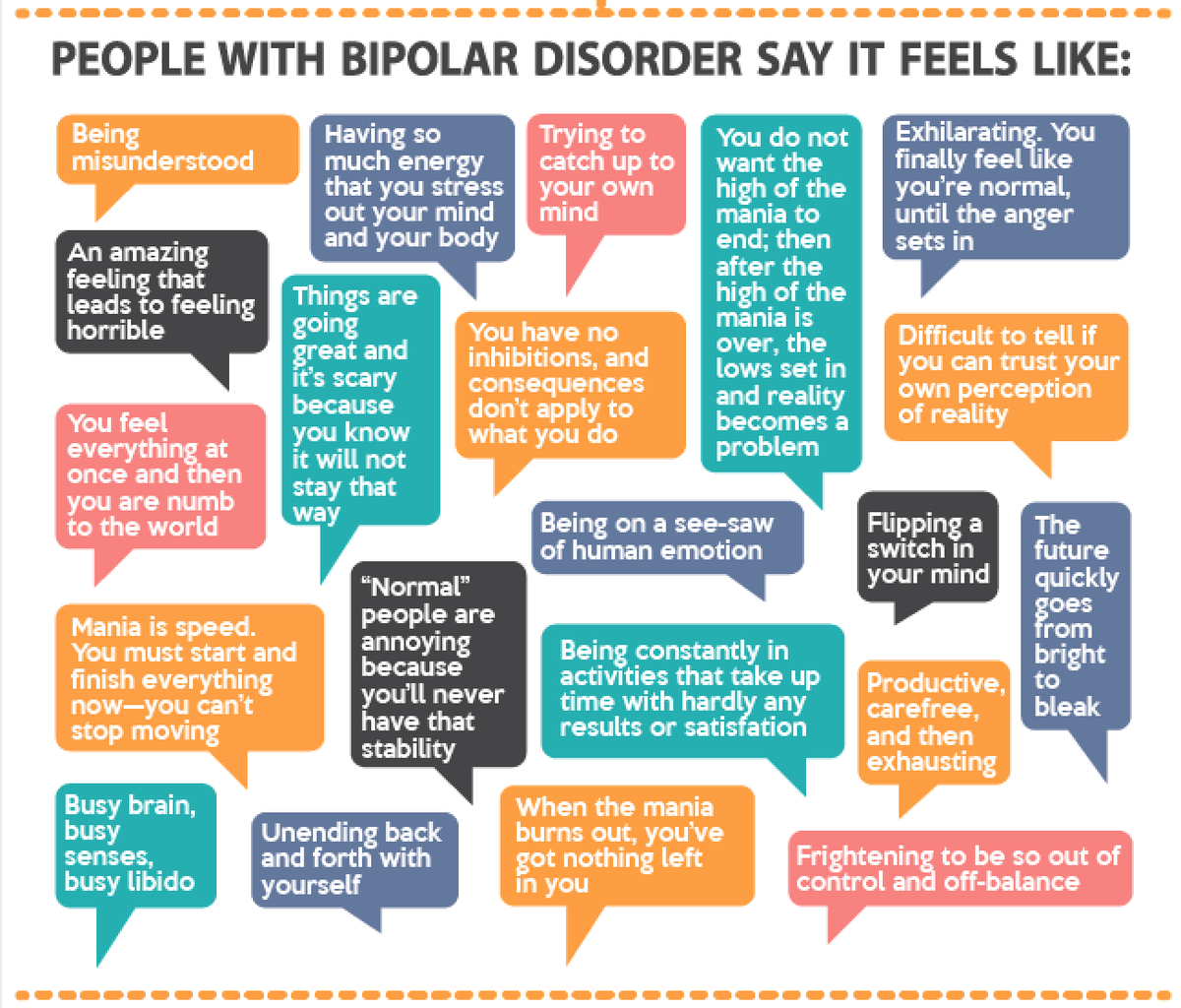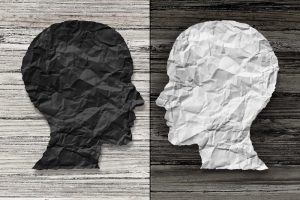With a prevalence of about 1% in the population, it is estimated that over 20 million people are living with bipolar disorder. Bipolar disorder can be an isolating experience. And many people who live with bipolar disorder face stigma and discrimination due to their illness. This blog post will cover what you need to know about this condition. From understanding what it is and its different types, to how you can cope with it. We’ll also discuss the challenges faced by those who live with bipolar depression. As well as ways for self-help techniques, treatments, and therapies that can help manage your symptoms.
Contents
- 1 Understanding Bipolar Disorder
- 2 Myths And Facts Associated With Bipolar Disorder
- 3 Living With Bipolar Disorder
- 4 The Toll On Family Friends And Relatives
- 5 Stigma And Discrimination Associated With Bipolar Disorder
- 6 Positives Of Living With Bipolar Disorder
- 7 Managing Bipolar Disorder
- 8 Helping Someone With Bipolar Disorder
- 9 Talking To a Professional
- 10 Expert Comments On Bipolar Disorder
- 11 Movies And Books On Living With Bipolar Disorder
- 12 Conclusion
- 13 A Word From Therapy Mantra
Understanding Bipolar Disorder
What Is Bipolar Disorder?

Bipolar disorder is a mental illness that causes people to experience extreme mood swings. These mood swings can range from manic highs (hypomania) to depressive lows. Bipolar disorder affects how you think, feel, and behave. And it can interfere with your ability to carry out everyday activities.
What Are The Types Of Bipolar Disorder?
There are three main types of bipolar disorder: bipolar I, bipolar II, and cyclothymia.
Bipolar I Disorder: This is the most severe type of bipolar disorder. And it is characterized by manic highs and depressive lows. A person with bipolar I disorder may have episodes of mania that last for weeks or even months.
Bipolar II Disorder: This type of bipolar disorder is less severe than bipolar I disorder. And is characterized by hypomania (a less severe form of mania) and depressive lows.
Cyclothymia: This type of bipolar disorder is less severe than bipolar I or II disorders. And is characterized by a mix of hypomanic and depressive symptoms that last for at least two years.
What Are The Signs And Symptoms Of Bipolar Disorder?

The signs and symptoms of bipolar disorder can differ from person to person. However, some common signs and symptoms of bipolar disorder include:
Warning Signs Of Hypomania
If you are having a manic episode, there is a danger that you may do something reckless or harmful. It could have serious consequences that you might regret later. Some warning signs of hypomania include:
- Feeling very happy and energetic
- Having lots of ideas and being very creative
- Talking quickly and jumping from one topic to another
- Feeling restless or agitated
- Having problems sleeping
- Taking on too many activities or responsibilities
Warning Signs Of Depression
If you are having a depressive episode, there is a danger that you may harm yourself or attempt suicide. Some warning signs of depression include:
- Feeling very sad, hopeless, or empty
- Having a lot of negative thoughts about yourself, others, or the world
- Experiencing a loss of interest in activities you once enjoyed
- Feeling tired all the time
- Having trouble concentrating or making decisions
- Experiencing changes in appetite (usually eating more or less than usual)
- Experiencing problems with sleep (either sleeping too much or not enough)
Warning Signs Of Cyclothymia
If you are having a cyclothymic episode, there is a danger that you may develop bipolar disorder. Some warning signs of cyclothymia include:
- Having mood swings that last for at least two years
- Feeling very happy and energetic at times
- Feeling very sad and hopeless at other times
- Experiencing changes in appetite
- Having problems sleeping or concentrating
What Are The Causes Of Bipolar Depression?
There is no one cause of bipolar depression. Rather, it is thought that several factors may contribute to its development, including:
Genetics: Bipolar disorder tends to run in families. So there is likely a genetic component involved.
Brain chemistry: People with bipolar disorder have abnormal levels of certain chemicals in their brains.
Environmental Factors: Stressful life events or changes can trigger symptoms of bipolar disorder.
Myths And Facts Associated With Bipolar Disorder
The following are some common myths and facts about bipolar disorder:
Myth: Bipolar disorder is a rare condition.
Fact: Bipolar disorder is quite common, affecting approximately two percent of the population.
Myth: People with bipolar disorder are always in extreme moods.
Fact: Most people with bipolar disorder have periods of normal moods in between their episodes of mania and depression.
Myth: People with bipolar disorder are crazy or dangerous.
Fact: The vast majority of people with bipolar disorder are not violent and do not pose a danger to others.
Myth: Bipolar disorder can be cured with medication.
Fact: There is no cure for bipolar disorder, but with proper treatment and support, most people can manage their symptoms.
Living With Bipolar Disorder
Living with bipolar disorder can be difficult. The challenges that people with bipolar disorder face can vary depending on their situation. For example:
Challenges Faced By People With Bipolar Disorders In Relationships

People with bipolar disorder often face challenges in their relationships. Some of the most common challenges include:
Managing mood swings: People with bipolar disorder may have difficulty managing their emotions. And this can lead to problems in their relationships.
Handling anger: People with bipolar disorder may sometimes feel angry and irritable. And this can lead to fights or disagreements with their partners.
Dealing with stress: People with bipolar disorder are often under a lot of stress. It is due to the challenges of managing their condition. As a result, this can put a strain on relationships.
Negotiating roles and responsibilities: People with bipolar disorder may have trouble accepting that they need help managing certain tasks. And this can lead to disagreements about who does what in the relationship.
Challenges Faced By People With Bipolar Disorder In The Workplace

People with bipolar disorder often have difficulty holding down a job. Some of the challenges they face include:
Managing mood swings: People with bipolar disorder may have trouble managing their emotions. And this can lead to problems at work.
Handling stress: People with bipolar disorder are often under a lot of stress due to the challenges of managing their condition. This can lead to problems at work.
Dealing with changes: People with bipolar disorder may have trouble dealing with change. And this can lead to difficulties in the workplace.
Handling anger: People with bipolar disorder may sometimes feel angry and irritable. And this can lead to conflicts with co-workers.
Handling criticism: People with bipolar disorder may be more sensitive to criticism than others. And this can lead to conflicts at work.
Challenges Faced By People With Bipolar Disorder In Society
People with bipolar disorder often face stigma and discrimination. Some of how they are marginalized include:
Finding support: People with bipolar disorder may find it difficult to find support from family, friends, or co-workers. This can leave them feeling alone and frustrated.
Being seen as unstable: People with bipolar disorder are often seen as being unstable. And this can lead to them being treated differently by others.
Having their illness dismissed: There is a common misconception that people with bipolar disorder are just “crazy”. And this can lead to their illness being dismissed.
Being blamed for their condition: People with bipolar disorder are often blamed for their condition. And this can lead to them feeling ostracized by society.
Managing medication: People with bipolar disorder often have to take medication to control their condition. This can be difficult to do. Especially if they don’t have support from family or friends.
Effects Of Bipolar Disorder On Body

Bipolar disorder can also have a physical impact on the body. Some of the effects that it can have include:
Sleep problems: People with bipolar disorder may have difficulty sleeping and this can lead to fatigue.
Weight gain or loss: People with bipolar disorder may experience changes in their weight, often due to changes in their eating habits.
Heart problems: People with bipolar disorder are at a higher risk of developing heart problems.
Irregular menstrual cycles: Women with bipolar disorder may experience changes in their menstrual cycle.
Vision problems: People with bipolar disorder may have trouble seeing clearly and this can lead to eye strain.
Diabetes: People with bipolar disorder are at a higher risk of developing diabetes.
NOTE: This is not an exhaustive list – there are many other physical effects that bipolar disorder can have on the body.
The Toll On Family Friends And Relatives
Family, friends, and relatives of people with bipolar disorder are also affected by the condition. Some of how they are affected include:
Feeling overwhelmed: It can be difficult for family, friends, and relatives to deal with all the challenges. That comes with having a loved one with bipolar disorder.
Dealing with mood swings: Family, friends, and relatives of people with bipolar disorder may have to deal with the mood swings of the person with bipolar disorder. This can be difficult to cope with.
Feeling isolated: People who have a loved one with bipolar disorder often feel isolated from others. They may feel like they are the only ones who understand what is going on.
Feeling frustrated: Family, friends, and relatives of people with bipolar disorder often feel frustrated. Because they may not know how to help the person with bipolar disorder.
Action Steps For Family Friends And Relatives
Bipolar disorder can be a challenging condition to live with. However, with the right support, family, friends, and relatives can manage it effectively. There are some things that family, friends, and relatives can do. To help manage the challenges of having a loved one living with bipolar disorder:
Learn about bipolar disorder: The more family, friends, and relatives know about bipolar disorder. The better equipped they will be to deal with it.
Encourage medication compliance: Family, friends, and relatives should encourage the person with bipolar disorder to take their medication as prescribed.
Seek help for themselves: Family, friends, and relatives should seek help for themselves if they are feeling overwhelmed or frustrated. This can be done by talking to a therapist or joining a support group.
Stigma And Discrimination Associated With Bipolar Disorder
There is a lot of stigma and discrimination associated with bipolar disorder. This can be very challenging for people who are struggling with the condition. Some of how stigma and discrimination can affect people include making them feel:
Ashamed: People with bipolar disorder may feel ashamed of their condition. And this can lead to them hiding it from others.
Alone: People with bipolar disorder may feel like they are the only ones who are going through this and this can lead to isolation.
Guilty: People with bipolar disorder may feel guilty about the things they say or do when they are in a manic state.
Rejected: People with bipolar disorder may feel rejected by friends, family, and co-workers.
Stupid: People with bipolar disorder may feel like they are not smart enough to do the things they want to do.
NOTE: Bipolar disorder can be a very challenging condition to live with. It can lead to people feeling marginalized and ostracized by society.
Coping With The Stigma And Discrimination Associated With Bipolar Disorder
Unfortunately, there is a lot of stigma and discrimination associated with bipolar disorder. This can be due to the myths and misconceptions about the condition. Those are often portrayed in the media. People with bipolar disorder can often feel ashamed or embarrassed about their condition. And may find it difficult to talk about it openly. They may also have trouble finding employment or getting insurance coverage because of their diagnosis. Some of the ways that people with bipolar disorder can cope with the stigma and discrimination include:
Finding support: It is important to find support from family, friends, or co-workers. This can help you feel less alone and more supported.
Educating others about bipolar disorder: It is helpful to educate others about bipolar disorder. This can help to dispel some of the myths and misconceptions about the condition.
Building a positive self-image: It is important to have a positive self-image. Even if you are struggling with bipolar disorder. This can help you feel good about yourself and boost your confidence.
Treating bipolar disorder: It is essential to treat bipolar disorder through medication and therapy. This will help to improve your mental health and quality of life.
NOTE: This can be very difficult to deal with. And can lead to feelings of isolation, shame, and low self-esteem.
Positives Of Living With Bipolar Disorder

Despite the challenges that come with living with bipolar disorder, there are also many positives. Some of these include:
Ability to think outside the box: People with bipolar disorder often have an amazing ability to think outside the box and come up with creative solutions to problems.
Greater insight into emotions: People with bipolar disorder often have a greater insight into their emotions than those without the condition.
Ability to connect with others: People with bipolar disorder often have a strong connection with others and can form deep and meaningful relationships.
Greater empathy: People with bipolar disorder often have greater empathy for others and can feel what they are feeling.
Strong sense of purpose: People with bipolar disorder often have a strong sense of purpose in life and are driven to achieve their goals.
Managing Bipolar Disorder
There are several things that people with bipolar disorder can do to manage their condition. This includes:
Self-help Techniques
There are many self-help techniques that people with bipolar disorder can use to manage their condition. Some of these techniques include:
Monitoring moods: People with bipolar disorder can track their moods by keeping a journal or using mood tracking apps.
Exercising regularly: Exercise can help to improve moods and reduce stress.
Eating healthy: Eating healthy foods can help to boost your moods and energy levels.
Avoiding alcohol and caffeine: Alcohol and caffeine can worsen the symptoms of bipolar disorder.
Staying on schedule: It is important to stick to a regular sleep schedule, meal plan, and exercise routine.
Treatment And Therapies
Medication
People with bipolar disorder often need to take medication to control their condition. Such as mood stabilizers, antipsychotics, and antidepressants.
Mood Stabilizers: Mood stabilizers are medications that help to control the mood swings associated with bipolar disorder.
Antipsychotics: Antipsychotic medications are used to treat the symptoms of psychosis. Such as hallucinations and delusions.
Antidepressants: Antidepressants are used to treat the symptoms of depression. It can occur in people with bipolar disorder.
Therapy
Psychotherapy is a type of therapy that can be helpful for people with bipolar disorder. It can help to teach them how to manage their condition and deal with the challenges that come with it. Several types of psychotherapy may be useful for people with bipolar disorder, including:
Cognitive-behavioral therapy: Cognitive-behavioral therapy helps to change the way that people think and behave. It can help manage bipolar disorder.
Dialectical behavioral therapy: Dialectical behavioral therapy helps to improve communication and problem-solving skills. It can be useful for people with bipolar disorder who have difficulty regulating their emotions.
Family-focused therapy: Family-focused therapy helps to improve communication and relationships within the family. It can be helpful for people with bipolar disorder who have difficulty coping with stress.
Self-management programs
Self-management programs teach people with bipolar disorder how to manage their condition on their own by:
- Learning about their illness, treatment options. And how to recognize the early warning signs of a bipolar episode
- Setting goals for managing their illness. And tracking their progress over time
- Working closely with their health care providers to create a personalized treatment plan
- Connecting with other people who have bipolar disorder through support groups or online forums
- Learning how to relax and deal with stressors in a healthy way
- Practicing these skills daily
Helping Someone With Bipolar Disorder
If you know someone who is struggling with bipolar disorder, there are several things that you can do to help them. This includes:
Offering support: It is important to offer your support to the person with bipolar disorder. You can help them by listening to them, providing encouragement, and being there for them.
Helping them stick to their treatment plan: The person with bipolar disorder must stick to their treatment plan. You can help them by ensuring that they take their medication and attend therapy appointments.
Providing practical help: You can provide practical help to the person with bipolar disorder by helping them with tasks. Such as grocery shopping, laundry, and cooking.
Helping them stay healthy: The person with bipolar disorder needs to stay healthy. You can help them by encouraging them to exercise, eat healthily, and get enough sleep.
Reminding them that they are not alone: The person with bipolar disorder needs to know that they are not alone. You can remind them of this by telling them your own story or sharing information about support groups.
Talking To a Professional
If you are struggling with bipolar disorder, it may be helpful to talk to a professional. This includes:
A psychiatrist: A psychiatrist is a doctor who specializes in mental health disorders. He or she can help you to diagnose and treat bipolar disorder.
A therapist: A therapist is a counselor who can provide you with support and guidance. He or she can help you to cope with bipolar disorder.
A support group: A support group is a group of people who are struggling with the same condition as you. It can be helpful to talk to them about your experiences and get advice from them.
Expert Comments On Bipolar Disorder
“Bipolar disorder is a serious mental illness that can cause extreme mood swings, from periods of mania. Where people feel very high and overactive – to depression. It can be severe and make people feel very low. These mood swings can have a significant impact on how someone feels, thinks, and behaves.”
– Dr. Roger S. McIntyre, Psychiatrist, and Professor of Psychiatry at the University of Toronto
“Bipolar disorder is a highly treatable mental illness. But it often goes unrecognized or untreated. With the right treatment plan, people with bipolar disorder can lead healthy and productive lives.”
– Ann Pulver, Director of Communications & Public Affairs at the National Alliance on Mental Illness (NAMI)
Case Study
John is a 43-year-old man who was diagnosed with bipolar disorder about five years ago. He has been struggling to manage his condition. and has had difficulty keeping up with his job and family responsibilities. John’s wife recently suggested that he try dialectical behavioral therapy.
After meeting with a therapist, John learned how to better regulate his emotions and deal with stressors. He also learned how to better communicate with his wife and children. John has found that DBT has helped him to manage his bipolar disorder and improve his quality of life.
Movies And Books On Living With Bipolar Disorder
Bipolar disorder is a mental illness that is often depicted in movies and books. Some of the movies and books that deal with bipolar disorder include:
- Silver Linings Playbook
- A Beautiful Mind
- The Black Swan
- Perks of Being a Wallflower
- Angels in America
Conclusion
Living with bipolar disorder can be difficult. But it is possible to manage the condition and live a full life. There are many different treatments and therapies available for people with bipolar disorder. So it is important to work closely with a health care provider to find the right treatment plan for you. If you know someone who is struggling with bipolar disorder, there are ways that you can help them. You can provide practical help to make it a little easier for them. Remind them that they are not alone, and offer your support. As this might help them fight through the bipolar odds even more effectively.
A Word From Therapy Mantra
Your mental health — Your psychological, emotional, and social well-being — has an impact on every aspect of your life. Positive mental health essentially allows you to effectively deal with life’s everyday challenges.
At TherapyMantra, we have a team of therapists who provide affordable online therapy to assist you with issues such as depression, anxiety, stress, workplace Issues, addiction, relationship, OCD, LGBTQ, and PTSD. You can book a free therapy or download our free Android or iOS app.


